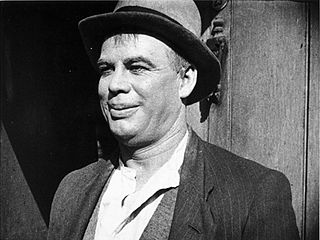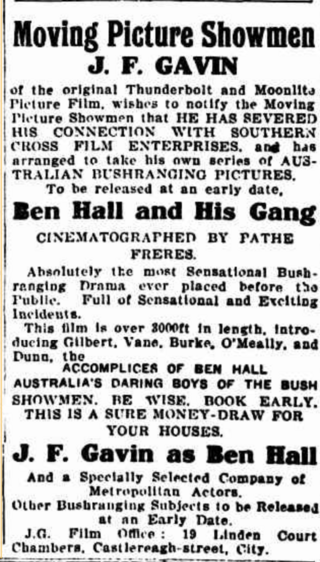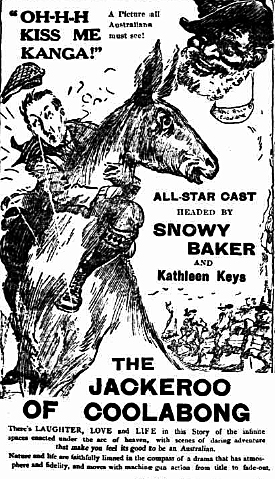
Thunderbolt is a 1910 Australian feature film based on the life of the bushranger Captain Thunderbolt. It was the directorial debut of John Gavin who later claimed it was the first "four-reel movie" made in Australia. It has also been called the first film made in New South Wales.

Mildred Harris was an American stage, film, and vaudeville actress during the early part of the 20th century. Harris began her career in the film industry as a child actress when she was age 10. She was also the first wife of Charlie Chaplin.

The Sentimental Bloke is a 1918 Australian silent film based on the 1915 verse novel The Songs of a Sentimental Bloke by C. J. Dennis. Produced and directed by Raymond Longford, the film stars Arthur Tauchert, Gilbert Emery, and Lottie Lyell, who also co-wrote the film with Longford.

John F. Gavin was a pioneer Australian film actor and director, one of the early filmmakers of the 1910s. He is best known for making films about bushrangers such as Captain Thunderbolt, Captain Moonlite, Ben Hall and Frank Gardiner. Known informally as 'Jack', Gavin worked in collaboration with his wife Agnes, who scripted many of his films.
Frank Beaumont "Beau" Smith, was an Australian film director, producer and exhibitor, best known for making low-budget comedies.
Fellers is a 1930 Australian comedy about three friends in the Australian Light Horse during the Palestine Campaign of World War I starring Arthur Tauchert, who was the lead in The Sentimental Bloke (1919). The film is mostly silent with a recorded music score as an accompaniment, but the last reel was synchronised with a few minutes of dialogue and a song.

Moonlite is a 1910 Australian bushranger film about Captain Moonlite, played by John Gavin, who also directed for producer H.A. Forsyth. It was also known as Captain Moonlite and is considered a lost film.

Ben Hall and his Gang is a 1911 Australian film about the bushranger Ben Hall, played by John Gavin, who also directed. It is considered a lost film.
Frank Gardiner, the King of the Road is a 1911 Australian film about the bushranger Frank Gardiner, played by John Gavin, who also directed. It is considered a lost film.

The Assigned Servant is a 1911 Australian silent film about a convict who is transported to Van Diemen's Land. It was made by the husband-and-wife team of John and Agnes Gavin and is considered a lost film.
A Melbourne Mystery is a 1913 Australian silent film starring John Gavin. Another title is The Unseen Hand.

The Murder of Captain Fryatt is a 1917 Australian silent film about the execution of Captain Charles Fryatt during World War I from John and Agnes Gavin.
Ginger Mick is a 1920 Australian silent film directed by Raymond Longford based on The Moods of Ginger Mick by C. J. Dennis, which had sold over 70,000 copies. It is a sequel to The Sentimental Bloke (1919) and is considered a lost film.
The Dinkum Bloke is a 1923 Australian silent film directed by Raymond Longford. Despite the title and the presence of Arthur Tauchert and Lottie Lyell in the cast, the film is not a direct sequel to The Sentimental Bloke (1919) or Ginger Mick (1920).

Arthur Michael Tauchert was an Australian acrobatic comedian, dancer, singer, film actor, and star of the Australian silent film, The Sentimental Bloke (1919).

The Jackeroo of Coolabong is a 1920 Australian silent film starring renowned Australian sportsman Snowy Baker. It was the last of three films he made with the husband and wife team of director Wilfred Lucas and writer Bess Meredyth, both of whom had been imported from Hollywood.
The Adorable Outcast is a 1928 Australian silent film directed by Norman Dawn about an adventurer who romances an island girl. The script was based on Beatrice Grimshaw's novel Conn of the Coral Seas. It was one of the most expensive films made in Australia until that time, and was Dawn's follow up to For the Term of His Natural Life (1927). It did not perform as well at the box office and helped cause Australasian Films to abandon feature film production.
The Australian Photo-Play Company was a short-lived but highly productive Australian film production company which operated from 1911 to 1912.
Ma Hogan's New Boarder was a 1915 film directed by Raymond Longford starring Charlie Chaplin impersonator Charles Evans. In the movie the lead "displays his antics and mannerisms."

Mates from the Murrumbidgee is a 1911 Australian silent movie. It is considered a lost film and was arguably the first Australian war film, being set during the Boer War.











